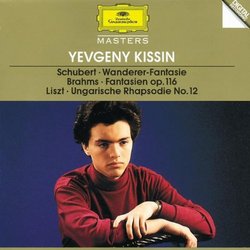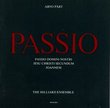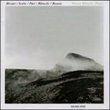| All Artists: Franz [Vienna] Schubert, Franz Liszt, Johannes Brahms, Evgeny Kissin Title: Schubert/Brahms/Liszt Members Wishing: 0 Total Copies: 0 Label: Dg Imports Original Release Date: 1/1/1991 Re-Release Date: 4/3/1995 Album Type: Original recording reissued, Import Genre: Classical Styles: Forms & Genres, Fantasies Number of Discs: 1 SwapaCD Credits: 1 UPC: 028944556223 |
Search - Franz [Vienna] Schubert, Franz Liszt, Johannes Brahms :: Schubert/Brahms/Liszt
 | Franz [Vienna] Schubert, Franz Liszt, Johannes Brahms Schubert/Brahms/Liszt Genre: Classical
This recital disc, recorded when Kissin was still in his teens, displays the phenomenal pianist's command of a spectrum extending from exuberant virtuoso style to deep-gazing, lyrical inwardness. Both, in fact, are presen... more » |
Larger Image |
CD DetailsSynopsis
Amazon.com essential recording This recital disc, recorded when Kissin was still in his teens, displays the phenomenal pianist's command of a spectrum extending from exuberant virtuoso style to deep-gazing, lyrical inwardness. Both, in fact, are present in the marvelous sonata-length Wanderer-Fantasie of Schubert. Kissin launches into its compulsive dactylic rhythm with an energy that soon sets sparks flying. It's a fiendishly difficult piece--in particular the fugal finale--which the composer himself could barely play, yet Kissin keeps our attention riveted on Schubert's promethean inventiveness. The Adagio's gently spun beauties as rendered here begin to approach the sphere of late Beethoven. Some Schubert song settings elaborately transcribed by Liszt are also included, to gorgeous effect. Kissin explores the inner world of Brahms's Op. 116 Fantasies with supreme sensitivity and an intuitive grasp of their densely concentrated vision. But when it comes to the athletic turns and scampering gymnastics of Liszt's Hungarian Rhapsody No. 12, Kissin can communicate a giddy mood of unlimited prowess and agility. This is the kind of artist whose every stage of development proves fascinating as he continues to mature. --Thomas May Similar CDs
|
CD ReviewsStunning Schubert, disappointing Brahms peter verelst | Antwerp, Belgium | 07/18/2000 (4 out of 5 stars) "I like this disc, mostly because of the great playing Kissin offers us in the Wanderer Fantasie and the lied transcriptions of Schubert. The Schubert Wanderer Fantasie is played with an enormous drive an force, which gives this interpretation a very personal touch that certainly is very convincing. Kissin really plays the music as ik his life depends on it. I prefer this version above those by other famous pianists as Pollini or Fleisher. The lied transcriptions of the four Schubert songs by Liszt are simply stunning ! Not only are these great transcriptions, but they are played with a beatiful range of sounds, which goes from almost whispered till a huge explosion of sounds, like in the last strophe of "aus dem wasser zu singen". Just compare these versions even to those by Jorge Bolet, and you'll have to agree with me that these versions are of superior quality. As much as I like the first part of this disc, I can't as much appreciate the Brahms' Fantasien op.116, although I am a big fan of the music. Kissin's playing isn't just fit to Brahms's special world ( although I have to admit I greatly enjoyed his live performance of Brahms's third sonata op.5) Of course Kissin was only 18 years old at the time of the recording, and he too has matured over the years. However, these late pianoworks by Brahms require a special approach that I still haven't found on cd (Wilhelm Kempff neither satisfies me)(if anyone can recommend me a great version, please let me know)(pverelst@hotmail.com) There is something missing, cakll it maturity or whatever. This is music of an old Brahms, reflecting and thinking over his life, and maybe this music isn't to be played at age 18. The Liszt Rhapsody is more suited to Kissin, who again shows that he possesses a great technique, which certainly works well in this work. In conclusion, I can say that I don't regret having bought this disc, because of the great Schubert playing." THE GENUINE ARTICLE DAVID BRYSON | Glossop Derbyshire England | 08/14/2003 (5 out of 5 stars) "Not ANOTHER ultimate virtuoso, I thought, remembering uneasily how Horowitz was dismissive, and Michelangeli downright rude, about the younger players. So this seemed like a good mix of pieces to start getting to know Kissin, with Liszt (of course) but Schubert and Brahms at their greatest too. There's no mistaking it, the divine spark is here and no sense of the assembly-line virtuoso that I suppose is what Horowitz and Michelangeli were complaining about. In the Wanderer Fantasy Kissin is his own man, taking a more romantic view of the first section than Richter or Pollini. As with Richter (here at his very best) there is a warmth to the playing that I miss from Pollini, and I have to say that Richter is fully equalled by the kid with all the hair gazing out solemnly from the back of the record box. Obviously Kissin has the advantage of up-to-date recorded sound, but other than that any choice between Kissin and Richter is going to be a matter of details and personal temperament, so I prefer not to choose but to have both. In the Brahms pieces I was able to compare Kissin with the classic performance from Katchen's omnibus edition, and the first thing that struck me was that Kissin is an absolute natural for Brahms. The rubato is supremely natural and the tempi in the four slow pieces are, to my ears, definitely better chosen. The first 3 intermezzi gain in eloquence from Kissin's slower speeds, and the strange and very inward E minor is genuinely played 'con intimissimo sentimento'. Katchen misses this one, I feel. The second of the two E major pieces shows up a characteristic that Katchen never quite grew out of in his all-too-short career, namely the well-meant delusion that greater 'depth', 'expressiveness', 'spirituality' or whatever is attained by playing pianissimo where the composer wrote 'piano' and playing adagio where the composer wrote 'andante'. This piece is not even andante but 'andantino' yet Katchen plays it adagio. Kissin's tempo is very reasonable as an andantino, but you might be surprised how the piece comes to life if you play it for yourself at a more flowing speed than we usually hear. In the three fast pieces I can't be so clear in my preference as both are excellent. The most striking diference is in the G minor capriccio with the central section featuring the one one and only big tune that I can recall in Brahms's solo piano music. Katchen is fast and ardent, Kissin slow and majestic. I can't make up my mind. Why should I have to?Liszt's 4 Schubert song arrangements are wonderful. Liszt was at his best when someone else, e.g. Schubert or Verdi, provided the actual music. The power of these familiar melodies comes over in a new light, especially as played with effortless grandeur, sensitivity and flexibility by Kissin. There is also one of Liszt's own Hungarian Rhapsodies, and the playing is pretty terrific without quite persuading me, as Horowitz and Cziffra (almost) do that Liszt's original compositions are anything but absolute bobbins as music. I shall be acquiring more of Kissin's work and listening out hard to try to catch a true individual voice as I catch it from Horowitz, Michelangeli, Richter, Serkin or Cziffra. Looking through some reviews I am pleased to see that people are keeping their critical faculties alert and not heaping on Kissin the indiscriminate plaudits that really do an injustice to Richter --he was a far more complex phenomenon than you would think to read much of it. One touch I have already noticed - Kissin understands the expressive potential of separating his hands, but as often as not plays the right hand first, which is a new one on me. I want to hear more." Magnificent Schubert Frederic Sala | Detroit, USA | 01/15/2002 (5 out of 5 stars) "I am not a big fan of Schubert in general, but the extraordinary Wanderer Fantasia is one of the greatest compositions ever created. Kissin powerful playing makes the piece extremely exciting, and the massive fugue in the end of the piece is amazing. The Listz-Schubert lieder and the Brahms fantasy are great. Finally, the ultra-virtuosic Liszt Rhapsody ends this magnificent recording."
|

 Track Listings (16) - Disc #1
Track Listings (16) - Disc #1

